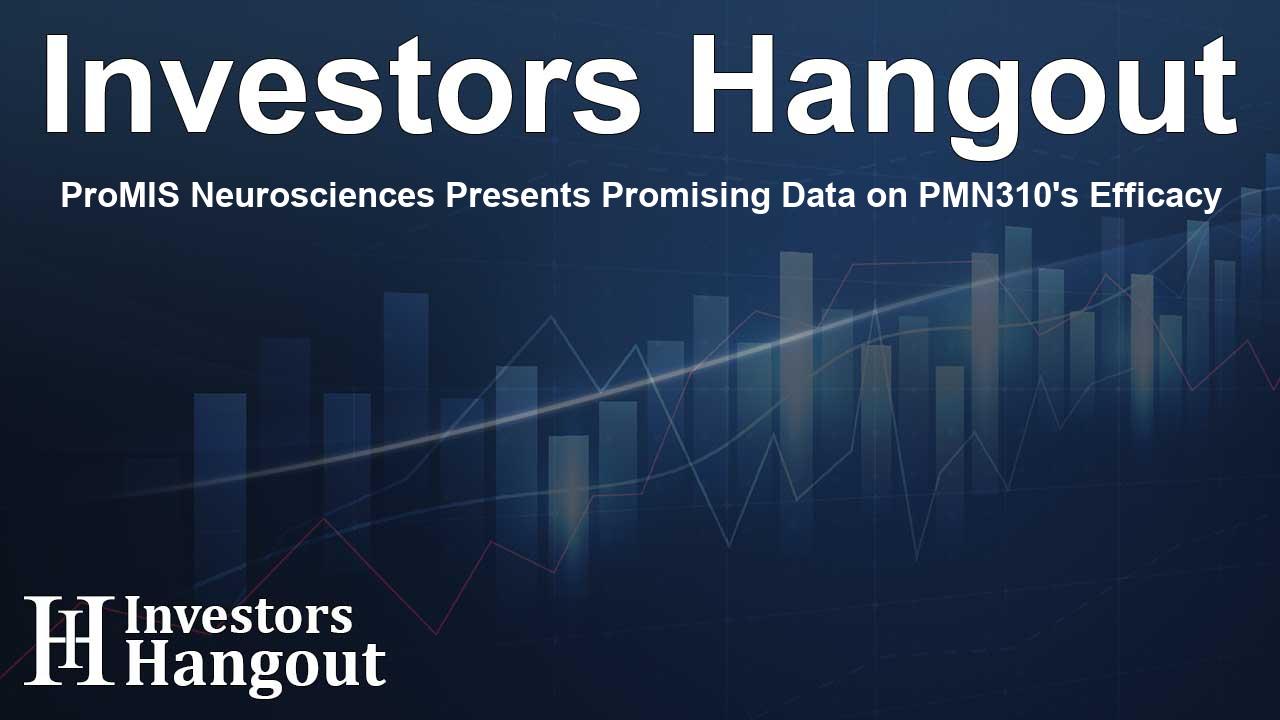ProMIS Neurosciences Presents Promising Data on PMN310's Efficacy

ProMIS Neurosciences Showcases PMN310's Targeting Abilities for Alzheimer’s Treatment
CAMBRIDGE, Massachusetts and TORONTO, Ontario — ProMIS Neurosciences Inc. (NASDAQ: PMN), a leading biotechnology company, has made significant strides in the field of antibody therapeutics. They focus on addressing neurodegenerative diseases, including Alzheimer’s disease (AD), with the impressive candidate, PMN310. Recent developments were highlighted in an oral presentation at the prestigious 4th International Conference on Cognitive & Behavioral Neurosciences (ICBN), emphasizing the exceptional ability of PMN310 to target toxic oligomers specific to AD.
Understanding Toxic Oligomers in Alzheimer’s Disease
Research indicates that the most harmful forms of amyloid-beta (Aß) in Alzheimer’s disease are soluble toxic oligomers rather than the traditionally considered insoluble fibrils or monomers. Effective treatment relies on the capability of therapeutic antibodies to pinpoint these toxic entities while avoiding interactions with non-toxic variants. PMN310 stands out for its design, aiming for precise targeting of these malign substances, thereby maximizing therapeutic efficacy.
Insights from the ICBN Presentation
“The presentation underscored PMN310’s distinct selectivity towards toxic oligomers,” stated Johanne Kaplan, Ph.D., Chief Development Officer at ProMIS Neurosciences. “This characteristic is crucial, especially considering the risk of amyloid-related imaging abnormalities (ARIA) that are linked with plaque-binding antibodies.” Kaplan’s comments reflect the considerable implications of PMN310's design in minimizing side effects while effectively adhering to harmful amyloid-beta oligomers.
Research Findings on PMN310's Efficacy
The research conducted involved evaluating the interaction between PMN310 and other Aß-directed antibodies with an oligomer-rich brain extract from Alzheimer’s patients. Utilizing surface plasmon resonance, researchers noted that PMN310 exhibited minimal interaction with Aß monomers, confirming its effectiveness in binding to toxic oligomers. Furthermore, immunohistochemistry analyses indicated PMN310’s non-binding profile to amyloid plaques and vascular deposits, further establishing its unique therapeutic window.
Details of the ICBN Oral Presentation
The oral presentation encapsulated vital information surrounding PMN310, with a focus on the following aspects:
Title: Distinguishing between amyloid-beta directed antibodies: Ability of PMN310 to target toxic oligomers despite competing species
Date/Time of Virtual Presentation: Friday, September 13 at 2:00pm WEST (6:00am PT / 9:00am ET)
Authors: Johanne Kaplan, Ebrima Gibbs, Juliane Coutts, Beibei Zhao, Neil R. Cashman
The Future of PMN310 and Company Progress
In a recent development, ProMIS Neurosciences reported encouraging topline results from its Phase 1a clinical trial examining PMN310 in humans. The clinical trial’s safety, tolerability, and pharmacokinetics have yielded positive results, paving the way for further clinical advancements. ProMIS is optimistic about progressing to a Phase 1b study within the upcoming quarters, potentially accelerating the path for PMN310 as a viable treatment for Alzheimer’s disease.
What is PMN310?
PMN310 is a humanized monoclonal antibody specifically designed to identify and neutralize soluble amyloid beta oligomers (A?Os). This approach is built on the premise that A?Os are more detrimental compared to A? monomers and amyloid plaques. Research shows that these oligomers can adversely affect neuronal function and contribute to neurodegeneration. PMN310 strives to mitigate these risks by directly addressing the toxic oligomers linked to Alzheimer’s disease progression.
Overview of ProMIS Neurosciences Inc.
ProMIS Neurosciences Inc. stands at the forefront of biotechnological innovation, concentrating on antibody therapies aimed at harmful misfolded proteins across neurodegenerative diseases like Alzheimer’s, ALS, and MSA. Their proprietary discovery platform, ProMIS™, uses computational techniques to identify unique 'Disease Specific Epitopes' present on misfolded proteins, tailoring antibody development for maximal therapeutic effect.
Frequently Asked Questions
What is PMN310 and its significance?
PMN310 is an innovative monoclonal antibody focused on targeting toxic soluble amyloid-beta oligomers, which play a crucial role in Alzheimer’s disease progression.
Where was the data about PMN310 presented?
The data was showcased at the 4th International Conference on Cognitive & Behavioral Neurosciences in Lisbon, emphasizing its unique targeting abilities.
How effective is PMN310 compared to other treatments?
PMN310 has demonstrated enhanced selectivity for toxic oligomers while avoiding interaction with non-toxic forms, potentially indicating greater efficacy than conventional therapies.
What are the future plans for PMN310?
The company aims to progress into a Phase 1b clinical study soon, following successful early trial results.
Where can I find more information about ProMIS Neurosciences?
For additional details, you may visit the ProMIS Neurosciences website or contact their media inquiries directly at the specified email address.
About Investors Hangout
Investors Hangout is a leading online stock forum for financial discussion and learning, offering a wide range of free tools and resources. It draws in traders of all levels, who exchange market knowledge, investigate trading tactics, and keep an eye on industry developments in real time. Featuring financial articles, stock message boards, quotes, charts, company profiles, and live news updates. Through cooperative learning and a wealth of informational resources, it helps users from novices creating their first portfolios to experts honing their techniques. Join Investors Hangout today: https://investorshangout.com/
Disclaimer: The content of this article is solely for general informational purposes only; it does not represent legal, financial, or investment advice. Investors Hangout does not offer financial advice; the author is not a licensed financial advisor. Consult a qualified advisor before making any financial or investment decisions based on this article. The author's interpretation of publicly available data shapes the opinions presented here; as a result, they should not be taken as advice to purchase, sell, or hold any securities mentioned or any other investments. The author does not guarantee the accuracy, completeness, or timeliness of any material, providing it "as is." Information and market conditions may change; past performance is not indicative of future outcomes. If any of the material offered here is inaccurate, please contact us for corrections.